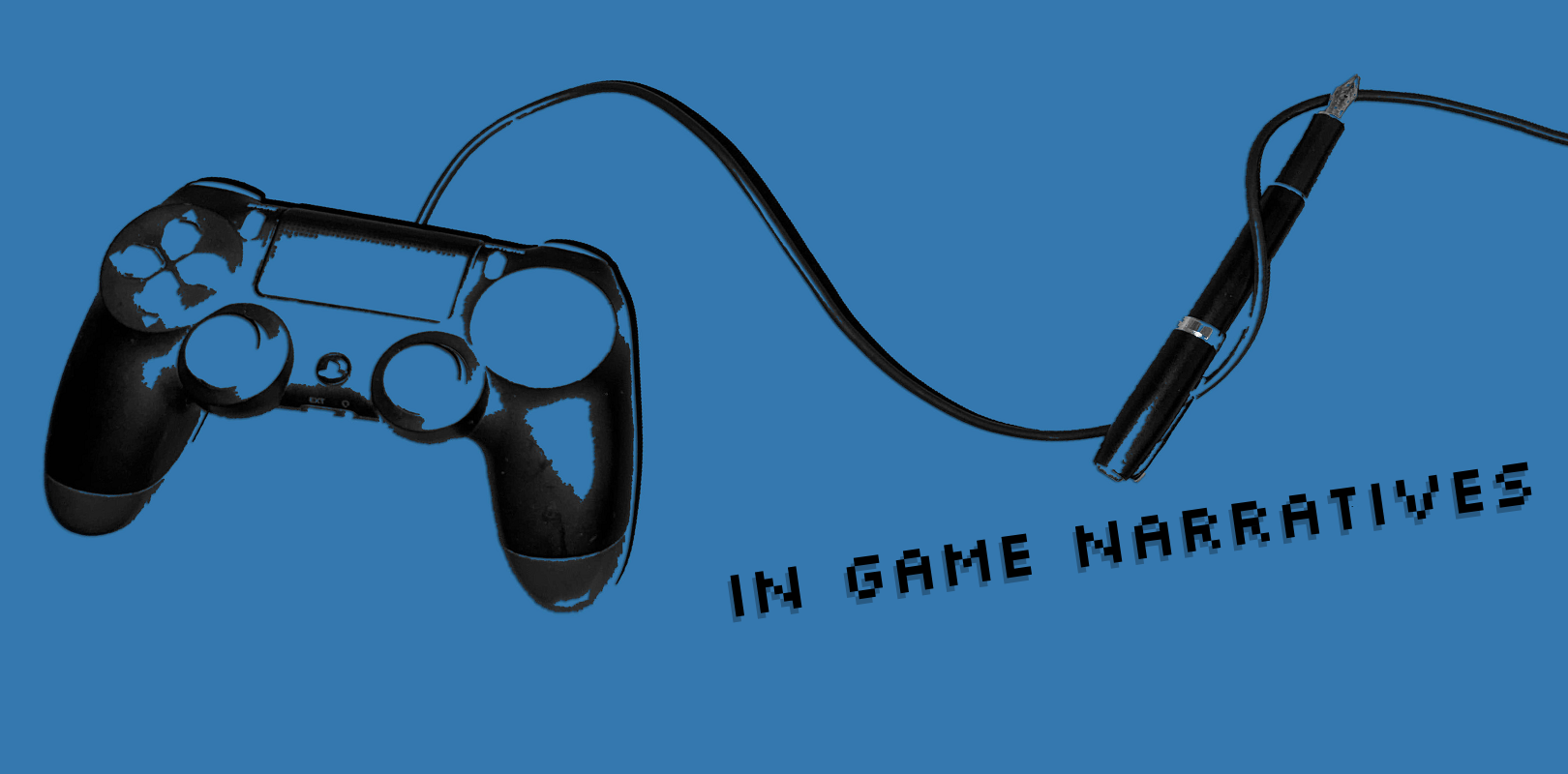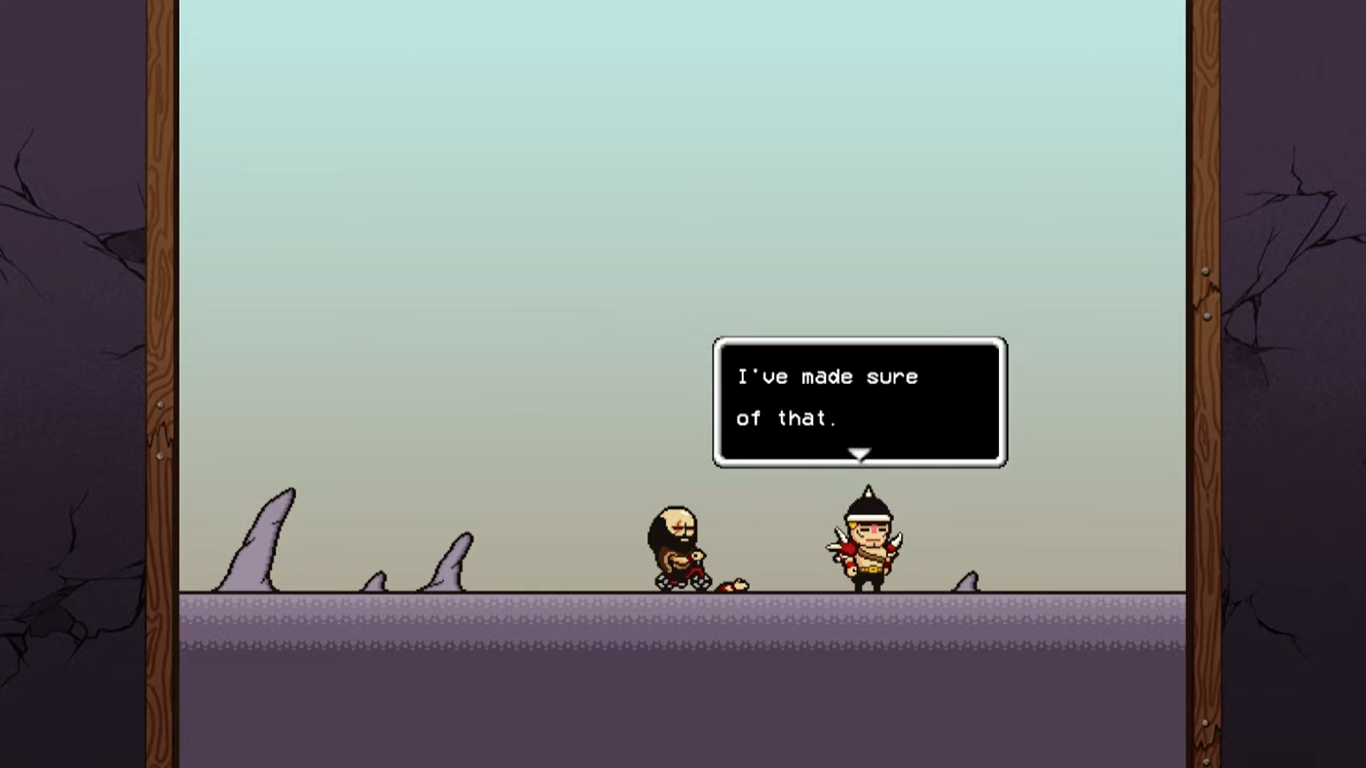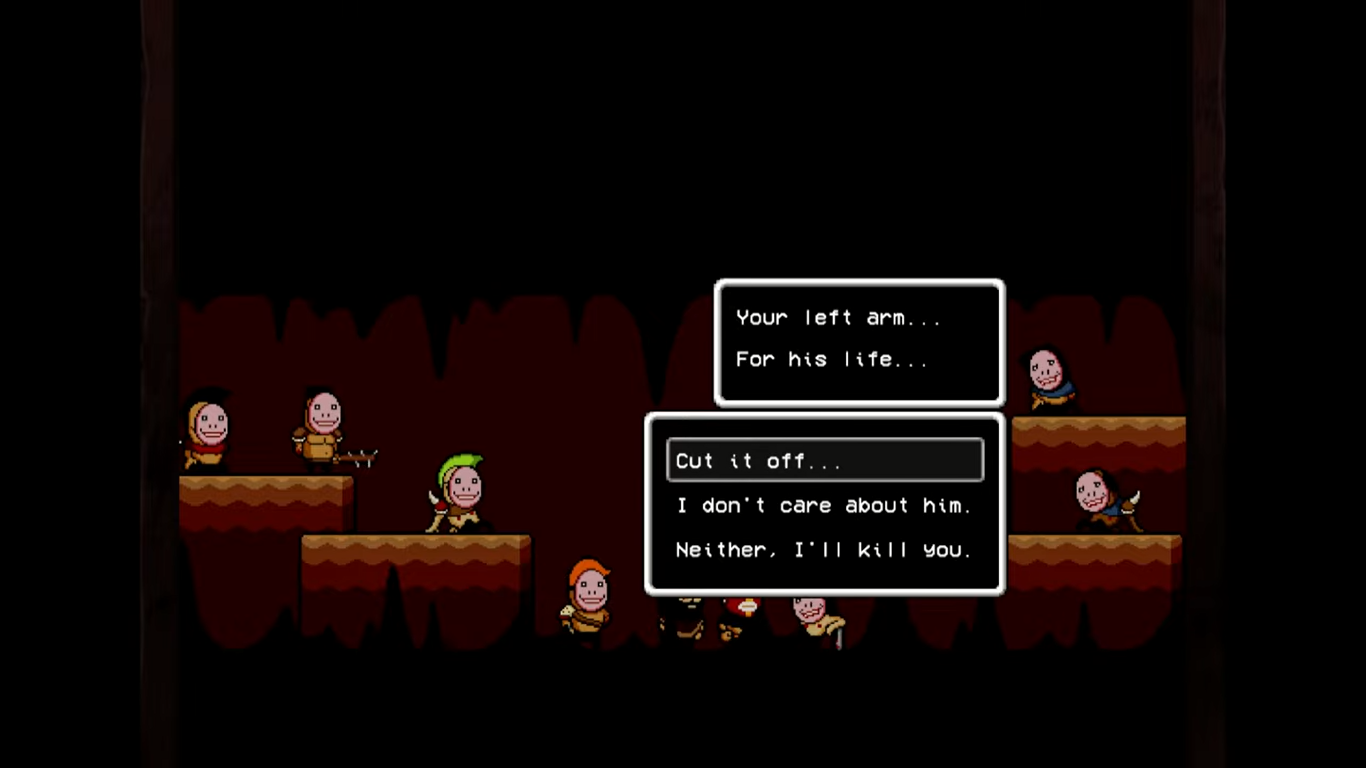𝘓𝘐𝘚𝘈 𝘵𝘩𝘦 𝘗𝘢𝘪𝘯𝘧𝘶𝘭, or Making Meaningful Choices
/ONE MAN’S FUTILE QUEST. (IMAGE COURTESTY OF DINGALING PRODUCTIONS).
When we think about games with choices that matter, we often think about games with multiple endings, determined by our decisions. LISA the Painful, one of the lesser-known MOTHER-inspired games out there, has only one. In the sense of story outcome, your choices don’t matter. After all…
FROM THE MOUTH OF THE BASTARD HIMSELF. (IMAGE COURTESY OF DINGALING PRODUCTIONS.)
There are three brief post-ending sequences determined by your choices, but those aren’t different futures you’ve forged; they’re glimpses into the past.
And yet, the game is filled with choices that feel meaningful. As it turns out, choices don’t need to affect story outcome to be important.
How?
The choices in LISA the Painful may not affect the story’s conclusion, but it does two other vital things:
1. It informs us of Brad’s character.
This might seem like a strange thing to claim. If Brad can make multiple choices, doesn’t that make his choices a stand-in for the player’s? Wouldn’t a more realised characterization of Brad not need player input?
And that is a reasonable thing to think. There is some variance on where Brad is on the selfish-selfless scale, depending on how you play him.
But the vast majority of choices Brad must make are forced upon him. And these decisions are not easy ones, as I’ll explain later.
Moreover, Brad doesn’t always listen to the player’s input. There are some impulses that are too deeply rooted in his pain and suffering to allow any room for rational thought or deviation. And it is in those moments of defiance that you are truly understand who Brad is. It is here that you learn of what choices he could’ve made, perhaps even wanted to make, but could not bring himself to make.
Perhaps more importantly, however:
2. It changes our experience with the game.
LISA the Painful takes advantage of that fact that it’s a video game, achieving ludonarrative resonance (if you don’t know what that is, Capcom did an article on it). One of the many ways it does so is through its choices.
TWO TOUGH CHOICES AND ONE FALSE ONE. (IMAGE COURTESY OF DINGALING PRODUCTIONS.)
This is one of the earliest choices presented in the game.
I believe most players, myself included, quickly chose to give up our arm during our first playthrough. While these statistics don’t account for subsequent playthroughs, the fact that only 6.9 per cent of players have the Selfish achievement (which can only be gained if Brad has both arms by the end of the game) as opposed to the Kinda Selfish (11.6 per cent) and Selfless (9.5 per cent) seems to support this. And it’s only natural – we’ve been conditioned by other games to pick the selfless choice.
But the loss of Brad’s arm is not simply a cosmetic piece or a plot point – it affects the very way you navigate the game, just as the loss of an arm would affect how you navigate real life.
Brad’s stats drop permanently. His addiction will become more severe, triggering withdrawal – which manifests mechanically as his stats tanking, sometimes to the point of doing no damage – more often. And your combos, which you’ve no doubt begun memorizing, will have completely changed, meaning you must go through the process of re-learning them – not unlike the adjustment period someone who lost an arm might have.
Likewise, losing a party member isn’t just bad because you’ll lose a character you might like. The world of LISA the Painful is an exceptionally brutal one. Your survival may very well hinge on a party member’s presence.
What really sells the sense of inevitable pain is the frequent presence of a false choice; one that defies the options laid out for Brad. But LISA the Painful is not a story with outs. Trying to get an easy way out will only further punish the player. In this instance, your entire party is reduced to a single HP point, and the option is eliminated. This is one of the kinder outcomes.
It is in this way that mechanics and story bleed together. Your choices matter because they affect not just the story, but the gameplay itself.
There are many ways to make your choices feel meaningful in video games. LISA the Painful proves that sometimes, when it comes to meaningful choices in story, the destination isn’t what matters – it’s the journey itself.
The name is Mole Cricket. The world is a fascinating place when you’re cursed with sapience. I have too many thoughts in my mind and too much time on my claws. Without the need to work as my human peers must, I have endless time to devote to video games.
I first delved into the MOTHER series upon pupating, having heard of my kind’s inclusion in the series’ third instalment. It sparked my love for games and inspired many new gamedevs. My blog posts will examine games made by those devs over the decades.
I also graduated at the University of Texas with a masters in English. (The more impressive feat was not getting squashed by my squeamish classmates). You can follow me and my fellow bloggers here!





